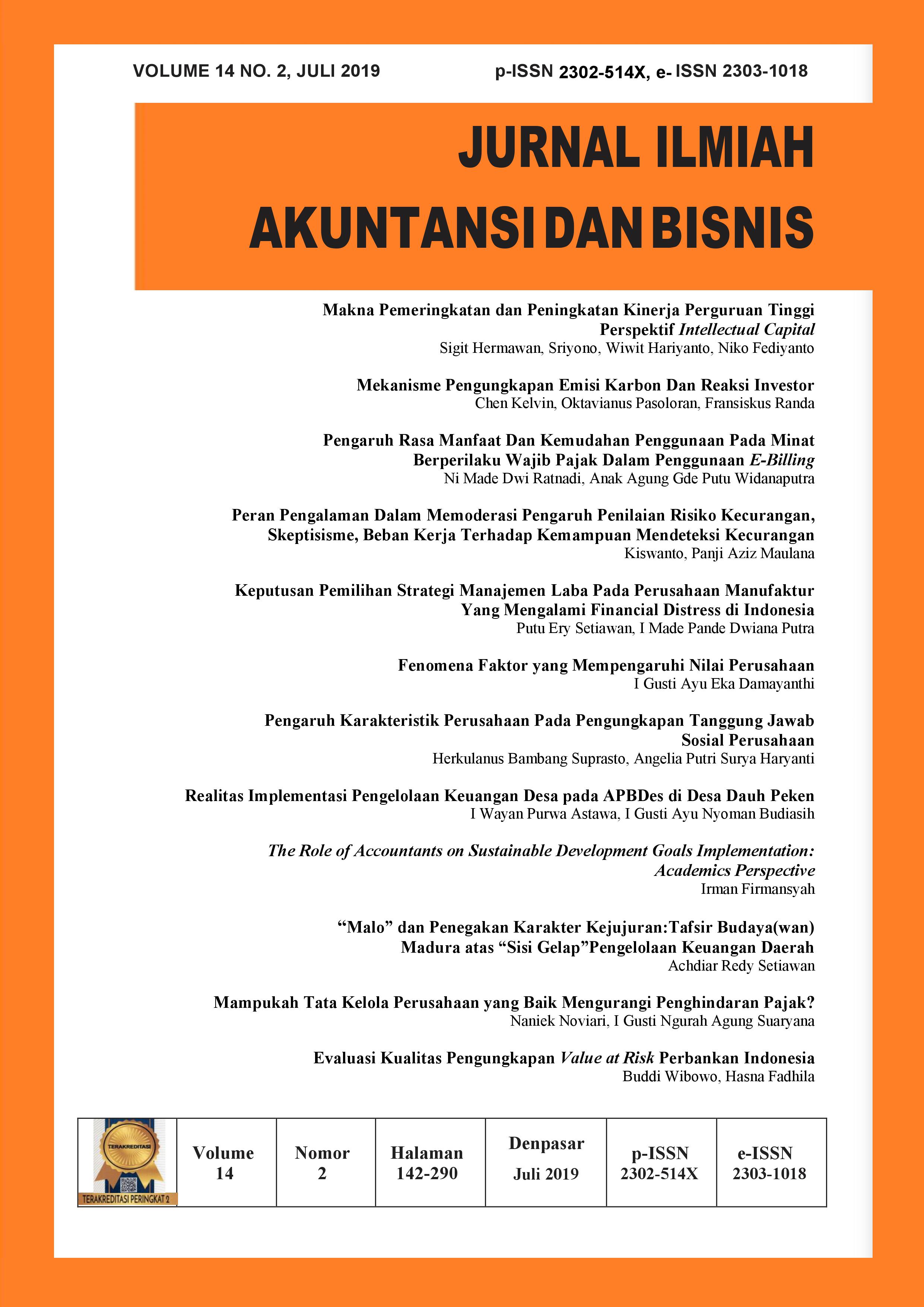Keputusan Pemilihan Strategi Manajemen Laba Pada Perusahaan Yang Mengalami Financial Distress di Indonesia
Abstract
This study discusses real earnings management and classification shifting along with accrual earnings management as an alternative strategy for companies that experience financial distress, and differences in choices of strategies at each stage of financial distress. This research was conducted on all manufacturing companies which experienced financial distress among those listed on the Indonesian Stock Exchange for six years from 2012 to 2017. Purposive sampling was used to collect data from all the manufacturing sector companies listed on the IDX that experienced financial distress. The sample companies totaled to 43 with a total of 258 observation data. The multiple linear regression technique was used in data analysis, analysis aided by SPSS. The results of this study indicate that in the early stages of financial distress, companies tend to choose the real earnings management strategy in the form of decreased production and classification shifting. While in the later stages the chosen strategy is real earnings management through a reduction in selling, general and administrative expenses. Finally at extreme stage, companies tend to adopt income-decreasing accruals strategies
Keywords: Financial distress, accrual earnings management, real earnings management, classification shifting
Downloads
References
Bartov, E. 1993, The timing of assets sales and earnings manipulation, The Accounting Review, Vol. 68 No. 4, pp. 840-855.
Charitou, A., Lambertides, N. dan Trigeorgis, L. 2007. Earnings Behaviour of Financially Distressed Firms: The Role of Institutional Ownership. Abacus Vol. 43 No. 3, pp. 271-296.
Callen J. L., Robb, S. W. G. and Segal, D. 2008, Revenue Manipulation and Restatements by Loss Firms, The Accounting Review, Vol. 27 No. 2, pp. 1-29.
Chen, J. Z. 2009, The choice between real and accounting earnings management, Working paper, University of Houston.
Dechow, P. M. and Schrand, C. 2004, Earnings Quality, The Research Foundation of CFA Institute.
DeFond, M. L. and Jiambalvo, J. 1994, Debt Covenant Violation and Manipulation of Accruals, Journal of Accounting and Economics, Vol. 17 No. 1-2, pp. 145-76.
Dichev, I. D. and Skinner, D. J. 2002, Large-sample Evidence on the Debt Covenant Hypothesis, Journal of Accounting Research, Vol. 40 No. 4, pp. 1091-1123.
Dewi, Ni Made Sintya Surya. 2015. Pengaruh Cash Holding, Profitabilitas dan Reputasi Auditor pada Perataan Laba. Skripsi S1 Fakultas Ekonomi dan Bisnis Universitas Udayana, Denpasar.
Fan, Y., Barua, A., Cready, W. and Thomas, W. 2010, Managing Earnings using Classification Shifting: Evidence from Quarterly Special Items, The Accounting Review, Vol. 85 No. 4, pp. 1303-23.
Gunny, K. A. 2010, The Relation between Earnings Management using Real Activities Manipulation and Future Performance: Evidence from Meeting Earnings Benchmarks, Contemporary Accounting Research, Vol. 27 No. 3, pp. 855-88.
Healy, P. M. and Wahlen, J. 2000, A review of the earnings management literature and its implications for standard setting, Accounting Horizons, Vol. 13 No. 4, pp. 365-383.
Jaggi, B. and Lee, P. 2002, Earnings Management Response to Debt Covenant Violations and Debt Restructuring, Journal of Accounting, Auditing and Finance, Vol. 17 No. 4, pp. 295-324.
Janes, T. D. 2003, Accruals, Financial Distress, and Debt Covenants, Doctoral Dissertation, University of Michigan.
Jiambalvo, J. 1996, Discussion of: Causes and consequences of earnings manipulation: An analysis of firms subject to enforcement actions by the SEC, Contemporary Accounting Research, Vol. 13 No. 1, pp. 37-47.
Jones, J. 1991, Earnings management during import relief investigations, Journal of Accounting Research, Vol. 29 No. 2, pp. 193-228.
Kothari, S. P., Leone, A. and Wasley, C. 2005, Performance matched discretionary accrual measures, Journal of Accounting and Economics, Vol. 39 No. 1, pp. 163-197.
Lara, J. M. G., Osma, B. G. and Neophytou, E. 2009, Earnings Quality in Ex-post Failed Firms, Accounting and Business Research, Vol. 39 No. 2, pp. 119-38.
Lee, L. F. 2012, Incentives to Inflate Reported Cash from Operations Using Classification and Timing, The Accounting Review, Vol. 87 No. 1, pp. 1-33.
Leggett, D. M., Parsons, L. M., and Reitenga, A. L. 2009, Real earnings management and subsequent operating performance, Working Paper. University of Alabama.
McVay, S. 2006, Earnings Management using Classification Shifting: An Examination of Core Earnings and Special Items, The Accounting Review, Vol. 81 No. 3, pp. 501-531.
Nagar, N., Sen, K. 2016. Earnings Management Strategies During Financial Distress. Working Paper Indian Institute of Management No. 2016-02-03.
Rosner, R. L. 2003, Earnings Manipulation in Failing Firms, Contemporary Accounting Research, Vol. 20 No. 2, pp. 361-408.
Scott, W. R, 2006.Financial Accounting Theory. Fourth Toronto: Prentice Hall International Inc.
Simbolon, Harry Andrian. 2015. Toshiba Accounting Scandal: Runtuhnya Etika Bangsa Jepang yang Sangat Mengagungkan Itu. Bussiness & Accounting. (Serial Online). www.akuntansiterapan.com. Diakses tanggal 6 September 2017.
Sloan, R. G. 1996, Do Stock Prices Fully Reflect Information in Accruals and Cash Flows about Future Earnings?,The Accounting Review, Vol. 71 No. 3, pp. 289-315.
Sweeney, A. P. 1994, Debt-covenant Violations and Managers‟ Accounting Responses, Journal of Accounting and Economics, Vol. 17 No. 3, pp. 281-308.
Taylor, G. K. and Xu, R. J. 2010, Consequences of real earnings management on subsequent operating performance, Research in Accounting Regulation, Vol. 22 No. 2, pp. 128-132.
Zang, A. 2012, Evidence on the trade-off between real activities manipulation and accrual-based earning management, The Accounting Review, Vol. 87 No. 2, pp. 675-703.




















